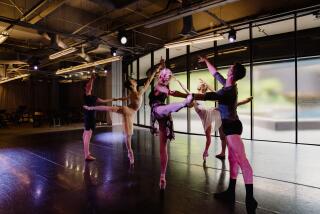PATRICIA FOY: Keeping Step With Nureyev
This week, PBS’ “Great Performances” salutes the Russian ballet legend Rudolf Nureyev in the 90-minute documentary “Nureyev.”
Produced and directed by Patricia Foy (“The Margot Fonteyn Story”), who knew the fiery Tartar since he defected from the then-Sovet Union in 1961, the film combines interviews with excerpts from numerous dances for which he is most widely known.
Besides Nureyev, who died Jan. 6 at 54 from complications of AIDS, others interviewed are his famous partner, the late Dame Margot Fonteyn; his mentor, Ninette de Valois; choreographer Roland Petit; dancer Sylvie Guillem, and Nureyev’s first dance teacher, 101-year-old Anna Undelstova. Dance excerpts include “Le Corsaire,” “The Sleeping Beauty,” “Marguerite and Armand,” “Cinderella” and “Pierrot Lunaire.”
Foy also took her cameras to the Russian dancer’s hometown of Ufa, halfway between Moscow and Siberia, to visit his family and friends as well as the modest wooden house his family shared with two others.
Times Staff Writer Susan King talked with Foy about the documentary and her friendship with Nureyev.
Do you think Nureyev agreed to participate in the documentary because you were friends?
I am absolutely sure. He was so suspicious of everyone. I was making a program on Margot Fonteyn and obviously I wanted Rudolf to appear in it. He was very unpredictable. So I wrote him a note and said I was making this program on Margot and would he agree to appear on it. I added underneath that I would dearly love to make a program about his life. He never wrote letters, but he sent a message through his agent: “If Margot will appear in my program, I will appear in hers.”
Did you know that Nureyev was ill when you began the documentary in 1990?
I never realized it. Margot was still alive when these rumors came around and she went to Paris to see him to find out. She said, “I am so nervous to go. I know he will tell me.” She came back and said, “He’s fine. It’s not true. He was in great form.”
The reason I never thought it was true was because he was so terrified of death. Once when I was working with him I had to go to a funeral in the afternoon. I asked someone who was there how I could get to this particular crematory. Rudolf jumped up and said, “Do not discuss death in front of me. I will not hear it. I will not hear. Not one word. I leave room.” I couldn’t believe that if he was seriously ill, he could be himself. Margot felt the same. We were both terribly fooled.
But didn’t he fool everyone by continuing to perform?
I think he dared death. He was such a rebel. He stood up to everyone--including death. That is really what it came down to.
Were there any subjects he wouldn’t discuss?
I don’t think so. He was always a very private person. I wouldn’t have said to him, “Tell me about your homosexuality or are you bisexual?” I feel in a way that when I am making a program about someone, it is like having a guest in your house.
Now everybody is writing about his homosexuality. But, in fact, he never had a partner. Never. The love of his life was (the late Danish ballet star) Erik Bruhn. But they were not together. When he came out of Russia he looked up Erik. Rudolf was only 23 and Erik taught him a great deal of style. I think what unfortunately happened was a case of the pupil overtaking the teacher.
You mentioned that Nureyev was defiant and a rebel. He also was known to be very difficult. Did you ever encounter that side of him?
I have seen him be difficult, and oh boy! Working with him all those years, he was always fine. It may be because I knew him before he reached superstar status, and also because I was such a close friend of Margot’s. But on the other hand, he used to turn on his friends quite often for various reasons. I always had it in the back of my mind seeing what he could be. It was like having an unexploded bomb. You weren’t sure it would go off. It never did, but it could have. I never took him for granted.
What was it like visiting his hometown of Ufa?
You can’t imagine how they lived. Those wooden houses had dirt floors. He used to faint at school because they had nothing to eat. They would dig a hole in the floor to bury potatoes and then dig them up and cook them as needed. That is where he came from. He came from sharing a tiny room with two other families and ended up with seven homes.
“Great Performances: Nureyev” airs Friday at 8 p.m. on KVCR, KPBS and 9 p.m. on KCET.
More to Read
The complete guide to home viewing
Get Screen Gab for everything about the TV shows and streaming movies everyone’s talking about.
You may occasionally receive promotional content from the Los Angeles Times.







